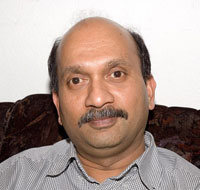
Renewable energy technologies and its adaptation in an urban environment
K. Ravindranathan Thampi
School of Chemical & Bioprocess Engineering, University College Dublin, Dublin-4, Ireland
Ravindranathan Thampi joined the UCD School of Chemical & Bioprocess Engineering as the SFI-Airtricity Professor in Solar Energy Engineering in July 2009. His research group is devoted to the study of chemical solar energy conversion and fuel cell systems. He is also involved with Science Foundation Ireland's (SFI) Strategic Research Cluster (SRC) in 'Advanced Biomimetic Materials for Solar Energy Conversion'. His research focuses on four topics: (a) new and inexpensive PV technology (3rd generation PV), (b) solar H2 production through water splitting, (c) fixation of CO2 using solar energy and (d) fuel cells. After finishing M.Sc. from the University of Kerala, India, he obtained his Ph.D. from the Indian Institute of Technology (IIT) Madras. Subsequently he joined the research centre of Indian Petrochemicals Corporation Ltd. Before joining UCD in July 2009, he was a group leader and Project Manager at the Laboratory of Photonics & Interfaces (LPI), EPFL, Lausanne, Switzerland, where he worked for over 23 years and intimately followed the invention and development of dye sensitized solar cells from its very beginning. He has extensive collaborations with several countries, notably EU countries, USA, India and Japan. Besides his teaching and research activities, he directs and manages many research projects funded by various national and international institutions. His interests lie in catalysis, fuel cells, nanomaterials, solar cells, and photoelectrochemical water splitting. Some of his inventions have been commercially applied and licensed to industries. He teaches 1) Chemistry of Renewable Energy Technologies, 2) Hydrocarbon Fuels and C1 chemistry, 3) Photovoltaics and 4) Applied Chemistry. He has published about 90 research papers on solar energy, photocatalysis, heterogeneous catalysis, solid state chemistry, fuel cells and biosensors in top international journals and books. He was an Associate Editor of the ASME Journal of Fuel Cell Science and Technology. He was also an Editorial Board Member of IJoMS (International Journal of Materials Science). He has ten patents to his credit. He was the international co-ordinator of the ISCB biosensor development project funded jointly by the Swiss and Indian governments, which has now reached the commercial prototype stage (licensed to industry) of the value-chain. His past industrial experience include the scaling up of a laboratory invention in catalysis to a large commercial petrochemical plant. His other experience includes IP management and assisting industrial start-ups. He serves as an expert in several international scientific review panels. Earlier, he was a member of the IEA SOFC annexe panel for making standards for electrochemically testing solid oxide fuel cells.
Abstract
